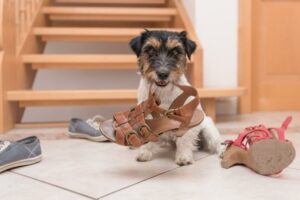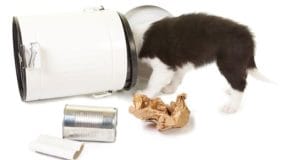
Have you ever heard the expression “eat like a dog” or “dogs eat anything?” Ever wonder where those stem from? If you own a dog, you know firsthand that from time to time they get curious and occasionally try to ingest something that they shouldn’t.
We’ve all heard horror stories of a dog having to be rushed to the ER to have his stomach pumped, or know of a person whose pup has passed a foreign object and was back to normal immediately after. What should you do if your dog eats something that he shouldn’t? Should you take him to the vet or wait to see if it passes in his stools? Check out our suggestions below.
Signs Your Pet Ate Something Foreign
If your dog is exhibiting any of the following symptoms, it may mean that he ingested something foreign or toxic:
- Vomiting (usually starts as food and proceeds to water) or gagging
- Painful abdomen
- Lack of appetite
- Lethargy
- Changes in typical behavior
- Changes in bowels — diarrhea, constipation
Go to the Vet Immediately
If your dog ingests a foreign object, you should take her to the vet. If your normal vet is unavailable, call a 24-hour emergency animal clinic and describe the situation. According to Shari Brown, DVM, the best measure is to allow the professionals to properly assess the situation.
“Owners should not wait to see if the object will pass on its own. Do not try to induce vomiting without a veterinarian’s okay, as there are some foreign bodies that can cause just as much harm coming back out.”
Treatment Options
If the veterinarian suspects that a foreign object has been ingested, they will order X-rays to determine the appropriate method of treatment. Depending on the severity of the situation, a vet may able to help your dog pass the object by inducing vomiting.
Some objects may need to be removed through endoscopy. If that is the case, the vet will place a long tube down your dog’s throat and will remove the object from her stomach. “This is non-invasive, involves less risks, and the only recovery time is from the anesthesia,” says Brown.
If the object has passed through the stomach and into the intestines, however, a more invasive surgery may be required. “There are less complications if the object can be gotten out of the stomach than out of the intestines. If an intestinal obstruction occurs, there is a risk of having to remove some of the intestines, which increases the chance of complications.”
How to Prevent Your Pet From Eating Foreign Objects
The best way to keep your dog from ingesting foreign objects is to take preventative measures. Brown says that one of the easiest things to do if an owner knows that their dog is prone to eating certain foreign objects is to not allow access to them.
“I personally have had many owners tell me that their dog chews their stuffed toys, swallows the stuffing, etc. If that happens, don’t give your dog stuffed toys anymore. There are other toys that he can be given instead that he hopefully will not ingest.”
She also advises that people “dog-proof” their house to limit access to objects. “I typically tell owners it’s like having a baby. When you have a baby, you have to be diligent about keeping doors closed, things off the floor and out of the baby’s reach.
“When you have a dog (that) likes to consume everything, you need to do the exact same thing. You may need to get baby locks for cabinets and such to keep your dog from opening them, but locks are a whole lot cheaper than a potential three to four thousand dollar emergency surgery.”











